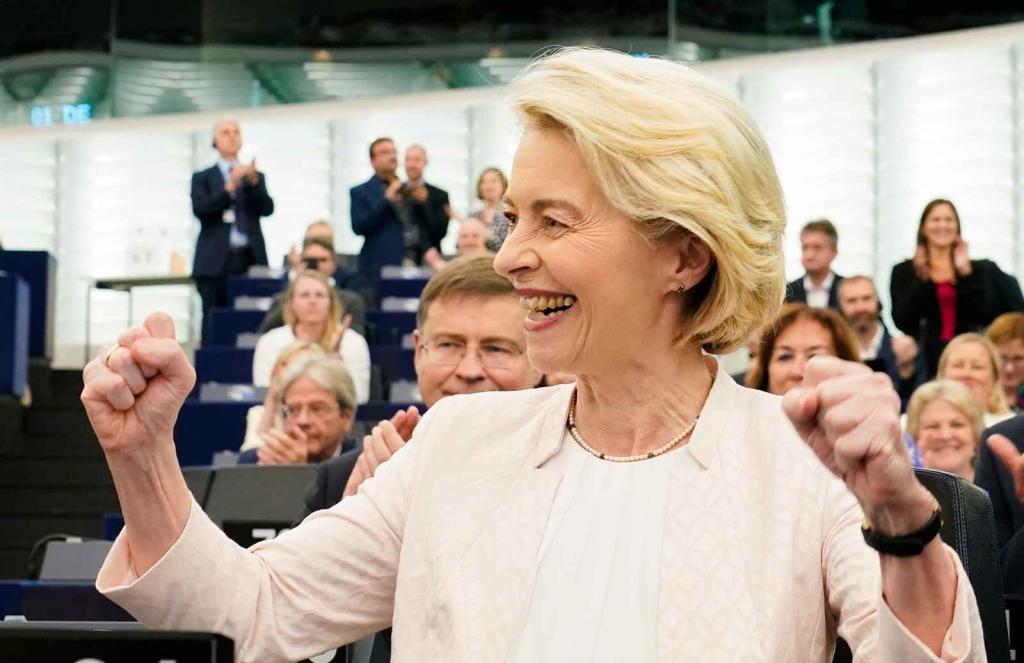Thessaloniki gets ready for its metro launch in November
The underground rapid transit lines have been under construction for almost two decades due to various project delays
 TheMayor.EU logo
TheMayor.EU logo 
Ursula von der Leyen celebrates the news of her re-election at the helm of the European Commission, Source: European Parliament/ Facebook
Find out her vision for the next five years and what’s in store for the European Union
It's official: Ursula von der Leyen was re-elected by the European Parliament to stay on as President of the European Commission for a second term. Mrs Von der Leyen received 401 votes in support: she needed 360 for the majority.
The results, in fact, showed greater and more robust support for the Commission’s President compared to the last time she faced the vote five years ago when she was approved with a margin of only nine votes.
The re-election of the German politician, who is also the first woman at the helm of the supranational organization, indicates trust in her abilities and the work done. It also signifies that there is a green light for the continuation of her line of policies.
Nevertheless, let’s see what she outlined as her vision of the development of the European Union for the next five years and whether there will be any changes in direction.
Von der Leyen tried to incorporate a wide view of compromises in order to beef up her support from different parts of the political spectrum.
The Commission President’s own party EPP, for instance, had the chance to get a nod of approval on some of their dearly held proposals, such as the European Defence Fund and a three-fold increase in Frontex's personnel. Even the topic of illegal migration had to be addressed through a promise to develop “comprehensive partnerships” with Mediterranean countries.
Then there were the Socialists. This is where Ursula von der Leyen chose to highlight and acknowledge the housing crisis gripping the continent and how it’s become increasingly harder to afford a home for many Europeans. She vowed to appoint the first-ever Housing Commissioner and to create a plan that would see the EU become an actor in boosting investment in the housing sector. That would be a change of tone and tune since traditionally housing has been considered a national issue and policy.
Housing could thus become a pillar of Cohesion Policy and the European Investment Bank could launch a pan-European investment platform to channel more public and private investment into affordable and sustainable housing schemes.
It’s not just residential housing either. The way cities are planned and organized will continue to be a priority thanks to the New European Bauhaus programme, which is one of the signature initiatives of Von der Leyen’s first term.
Both Greens and the leftist politicians should be pleased to know that the implementation of the Social Climate Fund will continue as planned. It will provide Member States with dedicated funding so that the most affected vulnerable groups, such as households in energy or transport poverty, are directly supported, and not left behind during the green transition.
Ursula von der Leyen was adamant that the goals set in the European Green Deal to achieve climate neutrality would not be abandoned, however, she also promised to put forward a new Clean Industrial Deal in the first 100 days indicating a warming up to the idea of reindustrialization of Europe.
“It will channel investment in infrastructure and industry, in particular for energy-intensive sectors. This will help create lead markets in everything from clean steel to clean tech and it will speed up planning, tendering, and permitting. We must be faster and simpler,” said President Von der Leyen.
How this balancing act between decarbonization and re-industrialization will play out, in reality, remains to be seen in the coming years. Either way, people have been promised lower energy bills in the near future.
The next step for Ursula von der Leyen is to begin assembling the members that will compose her next European Commission.

The underground rapid transit lines have been under construction for almost two decades due to various project delays

Now you can get your wine in Talence by paying directly in Bitcoin

That’s because the state has to spend money on updating the railway infrastructure rather than subsidizing the cost of the popular pass

Rethinking renewable energy sources for the urban landscape

The examples, compiled by Beyond Fossil Fuels, can inform and inspire communities and entrepreneurs that still feel trepidation at the prospect of energy transition

Now you can get your wine in Talence by paying directly in Bitcoin

The 10th European Conference on Sustainable Cities and Towns (ESCT) sets the stage for stronger cooperation between the EU, national and local level to fast track Europe's transition to climate neutrality.

At least, that’s the promise made by the mayor of Paris, Anne Hidalgo

The underground rapid transit lines have been under construction for almost two decades due to various project delays

At least, that’s the promise made by the mayor of Paris, Anne Hidalgo

Hostal de Pinós is located in the geographical centre of the autonomous region

Despite its church-y name, the district has long been known as the hangout spot for the artsy crowds

Urban dwellers across the EU are having a say in making their surroundings friendlier to people and the environment.

Forests in the EU can help green the European construction industry and bolster a continent-wide push for architectural improvements.

Apply by 10 November and do your part for the transformation of European public spaces

An interview with the Mayor of a Polish city that seeks to reinvent itself

An interview with the newly elected ICLEI President and Mayor of Malmö

A conversation with the Mayor of Lisbon about the spirit and dimensions of innovation present in the Portuguese capital














